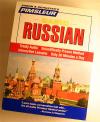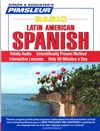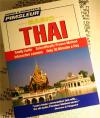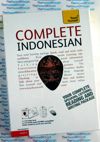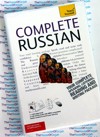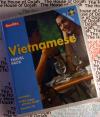Teach Yourself Complete Romanian- 2 Audio CDs and Book - Learn to speak Romanian
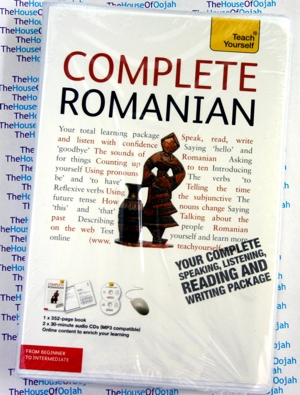
Teach Yourself Complete RomanianBook and 2 Audio CD'sGet Other Teach Yourself Language Learning Audio Books click here |
 |
Teach Yourself Complete Romanian - 2 Audio CDs and Book2 CDs and Book
*learn how to speak, understand and write Romanian Are you looking for a complete course in Romanian which takes you effortlessly from beginner to confident speaker? Whether you are starting from scratch, or are just out of practice, Complete Romanian will guarantee success!
Table of Contents: About the LanguageRomanian is a Romance language spoken by around 24 to 28 million people, primarily in Romania and Moldova. It has official status in Romania, Moldova and the Autonomous Province of Vojvodina in Serbia. While the language is used in the Republic of Moldova, there it is officially called Moldovan language for political reasons. Romanian speakers are scattered across many other countries, notably Italy, Spain, Israel, Portugal, United Kingdom, the United States, Canada, France and Germany. The Dacians, an Indo-European people, were the ancient inhabitants of Romanian territory. They were defeated by the Romans in 106, and part of Dacia (Oltenia, Banat and Transylvania) became a Roman province. This province, which was rich in ores, especially silver and gold, was colonized by the Romans, who brought with them Vulgar Latin as the language of administration and commerce, and who started a period of intense romanization, which gave birth to proto-Romanian language. But in the 3rd century AD, under the pressure of Free Dacians and from invasions of migratory populations such as Goths, the Roman Empire was forced to withdraw from Dacia, in 271 AD, leaving it to the Goths. It is matter of debate whether modern-day Romanians are descendants of the people that abandoned the area and settled south of the Danube or of the people that remained in Dacia. (See also Origin of the Romanians.) Owing to its people's geographical isolation, Romanian was probably among the first of the Romance languages to split from Latin. It received little influence from other Romance languages until the modern period (until the middle of the 18th century), and is therefore one of the most uniform languages in Europe. It is the most important of the remaining Eastern Romance languages and is more conservative than other Romance languages in nominal morphology. Romanian has preserved declension, but whereas Latin had six cases, Romanian has five: the nominative, vocative, accusative, genitive, and dative, and still holds the neuter gender. However, the verb morphology of Romanian has shown the same move towards a compound perfect and future tense as the other Romance languages. All the dialects of Romanian are believed to have been unified in a Proto-Romanian language up to sometime between the 7th and 10th centuries, when the area came under the influence of the Byzantine Empire. It was then that Romanian became influenced by the Slavic languages and to some degree the Greek. For example, Aromanian, one of the closest relatives of Romanian, has very few Slavic words. Also, the variations in the Daco-Romanian dialect (spoken throughout Romania and Moldova) are very small. The use of this uniform Daco-Romanian dialect extends well beyond the borders of the Romanian state: a Romanian-speaker from Moldova speaks the same language as a Romanian-speaker from the Serbian Banat. Romanian was influenced by Slavic (due to migration/assimilation, and feudal/ecclesiastical relations), Greek (Byzantine, then Phanariote), Turkish, and Hungarian, while the other Romance languages adopted words and features of Germanic.Romanian is spoken mostly in Southeastern Europe, although speakers of the language can be found all over the world, mostly due to emigration of Romanian nationals and the return of immigrants from Romania to their original countries. Romanian speakers account for 0,5% of the world's population, and 4% of the Romance-speaking population of the world. Romanian is the single official and national language in Romania and Moldova, although it shares the official status at regional level with other languages in the Moldovan autonomies of Gagauzia and Transnistria. Romanian is also an official language of the Autonomous Province of Vojvodina in Serbia along with five other languages. Romanian minorities are encountered in Serbia (Timok Valley), Ukraine (Chernivtsi and Odessa oblasts), Hungary (Gyula) and Bulgaria (Vidin). Large immigrant communities are found in Italy, Spain, France, and Portugal. The largest Romanian-speaking community in Asia is found in Israel, where as of 1995 Romanian is spoken by 5% of the population. Romanian is also spoken as a second language by people from Arabic-speaking countries who have studied in Romania. It is estimated that almost half a million Middle Eastern Arabs studied in Romania during the 1980s. Small Romanian-speaking communities are to be found in Kazakhstan and Russia. Romanian is also spoken within communities of Romanian and Moldovan immigrants in the United States, Canada and Australia, although they don't make up a large homogeneous community state-wide. |
Teach Youself Complete Romanian - Book and 2 Audio CD's |
| Stock Info: | Out of Print |

 0 Items (Empty)
0 Items (Empty)
